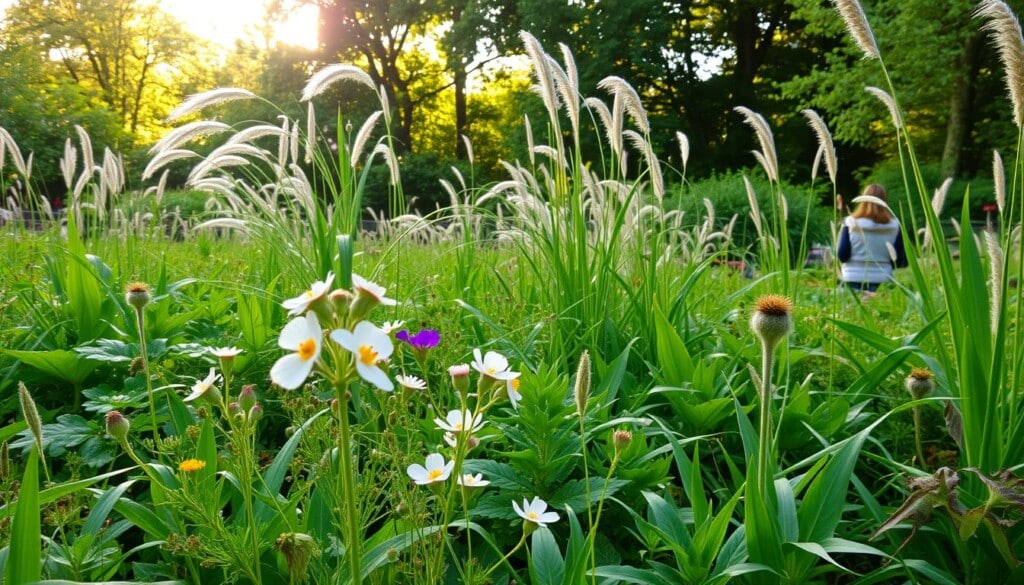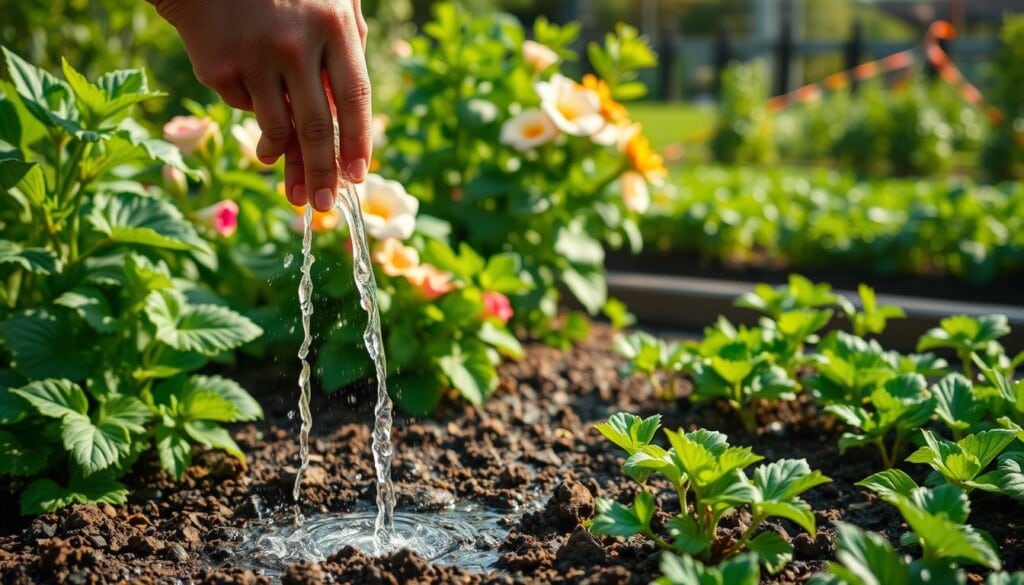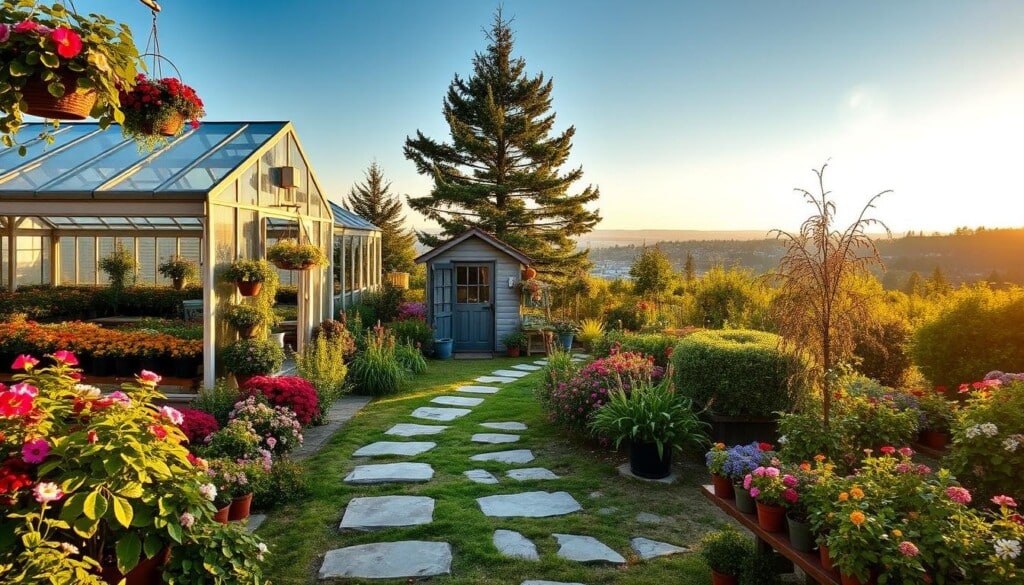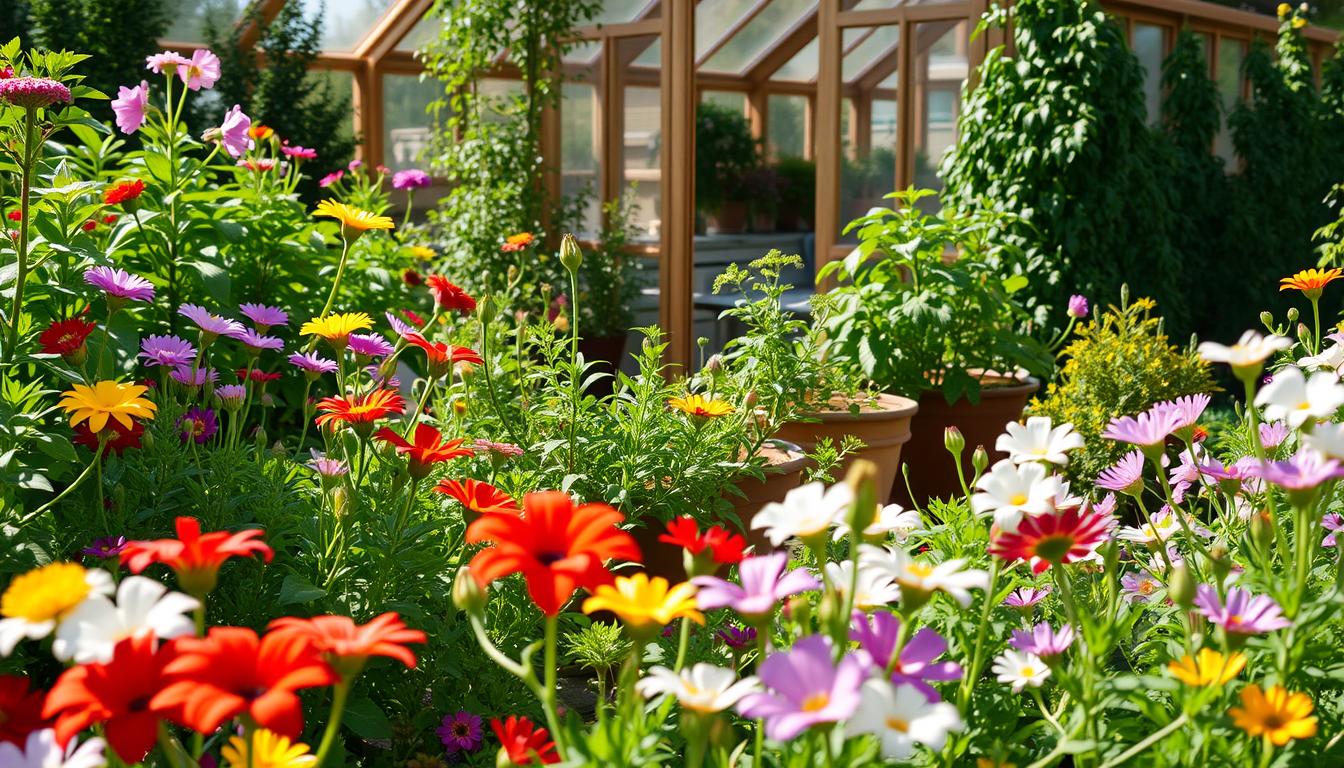Ever thought about turning a simple patch of soil into a lush garden? Gardening is more than a hobby; it’s a skill that needs knowledge and practice. We’ll share key tips for gardening that help both new and experienced gardeners.
Learning about your local growing conditions and picking the right plants are important. Good garden care leads to healthy growth. With these tips, anyone can create a garden that flourishes in their area.
Key Takeaways
- Understanding your gardening zone is key to success.
- Choosing the right plants boosts garden health.
- Soil quality greatly affects plant growth.
- Smart watering saves time and resources.
- Controlling pests keeps plants healthy.
- Joining local gardening groups offers community support.
Understanding Your Gardening Zone
Gardening success starts with knowing your USDA Hardiness Zone. These zones help pick plants that do well in certain temperatures. Each zone has its own weather, affecting what plants can survive winter and grow later.
Knowing your zone helps gardeners choose the right plants. This ensures plants can handle local weather changes.
Identifying Your USDA Planting Zone
To find your USDA planting zone, look at the USDA Plant Hardiness Zone Map. It breaks the U.S. into 13 zones based on winter temperatures. This map helps pick plants that will grow well in your area.
Knowing your zone helps plan your garden better. It lets you know when to plant, care for, and harvest your crops.
Seasonal Considerations for Your Area
Seasonal tips are key to growing plants well. You need to think about local frost dates and weather changes. Knowing these helps plan when to plant seeds or crops.
Being aware of how weather affects gardening helps keep plants healthy all year.
Choosing the Right Plants
Choosing the right plants is key for gardening. Native plants are a great choice because they grow well in local conditions. They need less care and help create healthy ecosystems.
Adding native grasses and wildflowers helps local pollinators. This boosts biodiversity in your garden.
Native Plants for Local Gardens
Native plants are vital for sustainable gardening. They fit the local climate, soil, and water needs. This means they need less care and fight off pests and diseases better.
By picking native plants, you create a garden that saves resources. It also brings harmony to the environment.
Annual vs. Perennial: What to Choose
It’s important to know the difference between annual and perennial plants. Annuals live for one season and add color quickly. Perennials come back year after year, but take time to grow.
Choosing a mix of both can make your garden lively all year. It fits your care level and style.

Soil Preparation for Optimal Growth
Soil is the base of a healthy garden, affecting plant health and growth. Knowing about soil quality and its makeup is key for organic gardening success. Soil testing helps gardeners learn about pH levels, nutrients, and organic matter. This knowledge guides them in making the right soil amendments.
Testing Soil Quality
Soil testing is a must for checking what affects plant growth. It looks at pH and nutrient levels. With this info, gardeners can add the right organic stuff to make soil rich and good for plants.
Organic Amendments for Nutrient Boost
Adding organic stuff to soil is important for making it nutrient-rich. Compost, aged manure, and other organic materials help. They improve soil structure, increase nutrients, and help with drainage. This creates a great place for roots to grow, helping plants thrive in organic gardens.
Effective Watering Techniques
Using the right watering methods is key to keeping plants healthy and growing well. Knowing how much water plants need, usually 1 to 2 inches a week, is important. A regular watering schedule helps roots grow strong and deep.
Understanding Watering Needs
Each plant has its own water needs, based on its type, soil, and climate. Saving water in gardening means giving plants just the right amount of moisture. Checking the soil moisture helps avoid too much or too little water, keeping plants healthy.
Drip Irrigation vs. Hand-Watering
Drip irrigation systems are efficient because they water the roots directly. They help save water by controlling how much is used. On the other hand, hand-watering is more work but can be adjusted for each plant’s needs. Choosing between drip irrigation and hand-watering depends on your garden’s needs.

Pest Management and Prevention
Keeping your garden healthy means managing pests well. Knowing how to spot pests is key. Watch your plants for signs like color changes, holes, or odd growth. Catching these signs early helps prevent damage.
Identifying Common Garden Pests
Common pests include aphids, spider mites, and caterpillars. Knowing these pests helps you manage them better. Look at the underside of leaves and stems for pests. Early detection helps protect your garden.
Organic Pest Control Options
Choosing organic pest control is good for the environment. Neem oil and insecticidal soaps are effective and safe for beneficial insects. These methods help control pests without harming your garden’s health. They make gardening more sustainable.
Local Resources for Gardening Success
Using local resources can make gardening easier. They offer the right supplies and advice for your area. Local nurseries and shops have plants and tips for your climate.
Local Nurseries and Plant Shops
Local nurseries are key for gardeners. They have plants that do well in your area. You can find everything from food plants to flowers.
Their staff knows a lot about gardening. They can help both new and experienced gardeners. They give tips on how to care for your plants.
Community Gardening Groups
Being part of a gardening group helps a lot. You can share tools and learn from others. It’s a great way to help the environment and meet people who love gardening.
By working together, you can solve problems and celebrate wins. It’s a supportive community for gardeners.

Utilizing Local Gardening Events
Getting involved in local gardening events is a great way to improve your gardening skills. You’ll also meet others who love gardening. Workshops are where you learn new things from experts.
At these events, you’ll get better at taking care of plants. You’ll learn how to grow them well.
Workshops and Seminars
Local gardening workshops are led by experts. They share important knowledge on many topics. It’s a chance to meet other gardeners.
You’ll learn new skills and make friends. These events make gardening more fun and rewarding.
Community Plant Swaps
Plant exchanges bring gardeners together. You can swap plants, seeds, and gardening tools for free. It’s a way to share and grow your garden.
By joining these events, you help the gardening community. You also make your garden more interesting.
Connecting with Local Businesses via LocalZ
LocalZ is a great tool for finding gardening services near you. It helps you find landscapers and gardening stores in your area. This makes it easy to connect with local businesses, supporting your community.
How to Find Gardening Services Nearby
With LocalZ, just enter your location to find gardening services. This saves time and connects you with experts who know your area. Whether you need help for a project or regular care, LocalZ has you covered.
Benefits of Supporting Local Vendors
Supporting local vendors has many benefits. It boosts the local economy and strengthens community bonds. Shopping locally also supports sustainable growth and builds personal connections with business owners. Learn more about supporting your neighborhood by visiting LocalZ.
Giving Back to the Community
LocalZ is key in supporting the community by giving 50% of its fees to local groups. This helps improve the area and supports betterment projects. It connects businesses with residents, creating a culture of giving back.
It’s important to engage with the local community for a healthy environment. Gardeners, like their plants, need to build strong neighborhood ties. Supporting local causes helps grow a better future for all.
LocalZ’s efforts make a real difference in the community. It helps local groups grow and offer vital services. By joining in community events, everyone works together, building a stronger, more united community.

